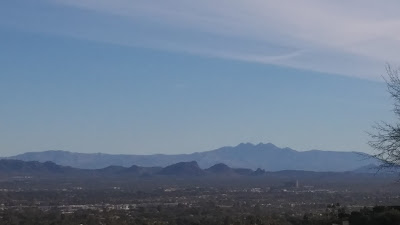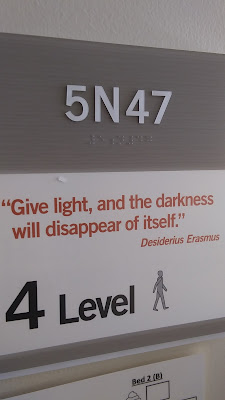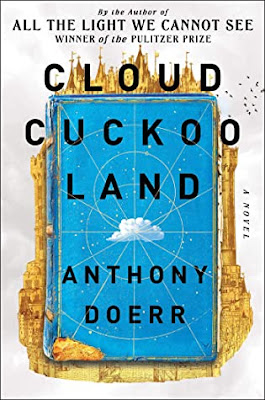 |
| View from Paradise Valley to Four Peaks in the distance |
A friend from Leelanau County, Michigan, called me a few days ago. I forget what day it was. She had been looking for a new post on this blog, and when nothing appeared she began to worry. What was going on? Were we all right? What a loyal blog reader! The thing is (I told her), I hadn’t wanted to put our family news out publicly until we were “out of the woods” and had answers to all the inevitable questions. In the midst of so much waiting and uncertainty, that was part of my way of dealing with things.
…Each morning comes along and you assume it will be similar enough to the previous one—that you will be safe, that your family will be alive, that you will be together, that life will remain mostly as it was. Then a moment arrives and everything changes.
- Anthony Doerr, Cloud Cuckoo Land
So here is what happened in our lives.
The Ordeal (or, Life Throws Another Unexpected Curve Ball)
Exactly a week after we bid an emotional farewell to Peasy in the morning and then had a last conversation with a dear friend the same night -- Wednesday to Wednesday, that is -- Fate ambushed us again. The Artist, a.k.a. David, woke without feeling in his left hand, and when I asked if he could lift that arm over his head, he could not. So as soon as we could hastily pull our clothes on and get out to the car (he was able to walk to the car, which was a good sign), we were on the road to the emergency room of the little hospital in Willcox, Northern Cochise Community Hospital (NCCH). Before we even arrived, David was regaining feeling and use of his left hand and arm, and the first word to me out in the waiting room was further cause for relief. The relief was short-lived, however, as more tests that same day revealed a serious blockage in his right carotid artery, bad enough that the ER doctors did not want him leaving the hospital.
Everyone knows hospitals are overcrowded these days (with COVID patients) as well as understaffed (partly for the same reason), so it was no surprise that he could not be moved to a regular room at NCCH. None was available. Nor was it a surprise that Tucson Medical Center (TMC), where the ER docs at NCCH wanted to send him, had no available beds, either. So he lay in the ER where he started from Wednesday morning until Friday night. The transfer then, by ambulance, was to St. Joseph Hospital in Phoenix – more specifically (and miraculously), to the world-class Barrow Neurological Institute, where on the following Monday morning he went into surgery for a carotid endarterectomy.
 |
| Good message! |
At no time did David have any blurred vision or mental confusion. Speech was unaffected. His wicked sense of humor and quick thinking were and remain intact. When he was released on Wednesday, I was able to bring him back to the cousin’s house, where we could stay in the guest suite together. (Jim, the cousin, also has a wicked sense of humor.) So we were very, very fortunate in more ways than one, i.e.,
o The stroke was a mild one.
o We got him to the hospital within the hour.
o Staff at NCCH were diligent in their testing, and the doctor there told us plainly that he should not leave to go home just because he was feeling better.
o The next shift ER doctor at NCCH somehow managed to get David into St. Joseph in Phoenix – and not only St. Joe but the Barrow Neurological Institute, a world-class teaching and research hospital.
o I was able to stay with David’s relatives and eventually bring David back here, too.
o The surgeon who performed the procedure was Dr. Michael Lawton, “head honcho” of Barrow. (David’s cousin and wife and their friends could hardly believe he was able to get into Barrow from Willcox – and so fast! – and to have Lawton as the surgeon had their heads spinning.)
o I was able to be with David (no small matter in these COVID days!) in his double room over the weekend and in pre-op, recovery, and in the ICU Tuesday, in addition to his private room on Wednesday while we waited for his discharge (always a long drawn-out affair, as many of you know).
So all in all, if he had to have a stroke, this one may have been a blessing, revealing as it did a blockage that might well have caused a much more severe stroke if left untreated. And if he had to have major surgery so far from our Michigan home and friends, having it done in a world-class hospital, by a world-class surgeon, was a miraculous piece of good fortune. Finally, as if that weren’t enough good luck, he now has had the luxury of very comfortable recovery time here in Jim and Carol’s home before we undertake the long return drive to our ghost town cabin, which is a little over 15 miles from the little hospital in Willcox and over 200 miles from Phoenix.
The Different Week We Lived
Generally speaking, we are (to use the Artist’s phrase) “joined at the hip” all winter long during our seasonal retirement. It is rare that one of us goes somewhere without the other, and three hours is about the longest separation we experience even then.
This past week was completely different from our usual way of life, winter or summer. David was flat on his back for eight days, in two different hospitals and, between hospitals, in an ambulance. Meanwhile, I commuted between Dos Cabezas and Willcox, then trekked to Phoenix, and then commuted between Paradise Valley and St. Joseph Hospital. While I was by myself, navigating unfamiliar streets and heavy traffic in a strange big city, David was being asked his date of birth multiple times a day, subjected to sophisticated diagnostic tests, and monitored every minute. His attempts at sleep were fraught. My nighttime situation could not have been more comfortable, from a physical point of view. Of course we were in contact by cell phone and spent as much time together as possible, most of it waiting for one thing or another to happen.
 |
| Strategizing my route |
 |
| Another sunset from the hospital parking garage |
One thing about traveling separate daily roads was that we had a lot to tell each other when together. On Sunday (since nothing much was going to happen that day), I took an afternoon break from the hospital, giving David’s cousin Jim a chance to visit, and I went a short distance away to the Heard Museum, “world's preeminent museum for the presentation, interpretation and advancement of American Indian art….” What a fabulous place! The Art was beautifully displayed, and I didn’t even try to see everything. Sometimes I didn’t even read the information but only stood in front of a work and let its power move me.
 |
| Sculpture group outside Heard Museum, Phoenix |
If the Artist and I were here in Phoenix for other reasons and both of us feeling tip-top, we would be visiting galleries and museums and bookstores galore, but such was not the case this trip.
Reading
The Artist’s cousin’s wife, Carol, is a champion reader, beside whom I feel like the rankest of amateurs. She not only keeps lists of all the books she reads but writes up an entire journal page for each book. (She is also a wonderful cook and gardener and sits on many civic boards and committees. A superwoman, in other words.) The first evening I was here, she brought an entire bag of books to my room that she had finished reading and was passing along to me, and by the next day four more books were stacked next to the bag, one being Cloud Cuckoo Land.
It isn’t often that I am reading a book on the New York Times bestseller list, as I’m frequently years or even decades behind the rest of my fellow book-loving Americans, and in that context I have to admit that I have yet to read Anthony Doerr’s previous bestseller, All the Light We Cannot See. But Cloud Cuckoo Land has been the perfect book for me to lose myself in off and on during the past week. The time span of the story is incredible, and we are not simply flashing back and forward in a single country or family, but hopping from one country to another and even into a future far beyond our own, with a complicated cast of apparently unrelated “main” characters. The only link seems to be the Greek story of Ulysses.
“Stranger, whoever you are,
open this to learn what will amaze you.”
Will Zeno and Anna and Konstance and Seymour and Omeir all be somehow saved by books? By stories? At about the midway point in this 626-page novel, I cannot presume to guess, but I can tell you that these characters have been good company for me during a time of anxiety in my own life.

7 comments:
So glad David is doing well and recovering from his small stroke. Will be eager to hear more on Cloud Cuckoo Land.
Karen, David is recovering more from the surgery than the stroke, but all is going well. As for the novel, here is my take on it:
How to describe Anthony Doerr’s CLOUD CUCKOO LAND without cheating and looking up what others have written about it? The structure, time flashes backward and forward, the many different story lines, with multiple “main” characters to keep separate and distinct (for some reason, the names Seymour and Zeno gave me the most trouble: I kept having to remind myself which was which — but then I was reading this book at a time of great mental turmoil, often in various hospital rooms) make it very challenging reading. David said, when I tried to answer his question (“What’s it about?”), “That doesn’t sound like your kind of book.” I think that response came after I had given him a long description of what I would call the sci-fi story line. And there is that. There is also the historical line having to do with the siege of Istanbul in the 15th century. But characters also wrestle with more familiar life problems, such as autism and its social challenges, coming to terms with their sexuality, relationships with or absences of parents, etc. When David said it didn’t sound like my kind of book, I told him that it is beautifully written, and then he acknowledged that that would make it my kind of book.
While I still think it’s fair to say that the story of Ulysses is a unifying feature, Homer’s epic is in the background, with another old Greek book — an actual (in the novel, anyway), physical book, besides its comedic tale — appearing in the lives of all the characters in one way or another. The persistence of stories and the survival of physical books is thus another unifying theme. How are stories lost? Found again? Translated? Blanks filled in? What does it mean to come home, and how can a story help us do that? I have never been an English major, but that is what I found in CLOUD CUCKOO LAND.
As for any “message” one might take away from the book, despite the many horrific scenes the various story lines contain, I think the author in the end might agree with the main character in a 2013 movie we watched the other evening, “Paradise,” directed by Diablo Cody. But read the book first, see how you feel about the author’s themes, and only then try the movie for its more obvious message.
OH, dear Pamela! With your long-time beautiful friend taking her leave of this world, Peasey leaving, with his absence a heavy burden for you both, then David and his surgery! The list of positive things that happened during David’s ordeal was a true and honest view of what happened, and I am so glad that all those events made David’s and hour journey down the medical road a good one. And that he is his old self - the picture of you and him in his robe is so wonderful to see. Thank you for the quote from the Anthony Doerr 📖 book. I will look for that one when we return in the spring to Brooklyn. Stay well, dear friends!!
Ah, dear Jeanie! We need to catch up soon by e-mail or something. I hope you and Antonio and his family in Brazil are all healthy and happy. As for us, “We maun totter on,” as the Robert Burns verse goes. Having returned to the mundane, less exciting, more familiar and comfortable everyday world, the “tottering on” doesn’t seem so bad. xxxooo!!!
Yes! A return to the “mundane, less exciting, more familiar and comfortable everyday” world sounds just fine to me! No more of your long drives, either. Whew!
Do tell…I could call you through Skype even if you’re not part of it, and we can talk for hours for $2-3. I DO enjoy reading your thoughts and I wonder if you prefer to write or if Skype is OK. I love both - connecting and staying in touch is so important to me these days. Hugs!
Thanks, Pamela. While I read and enjoyed Doerr’s first book, it was a challenge to get through. CCL sounds like it might be even more so, although your laying out various story lines certainly helps. I’m especially cautious about digging in at this particular point because I just had a knee replacement two weeks ago and I’m not sure how sharp my mind is, thanks to medication. Anyway, thank you. Take care of each other. Karen
Karen, a friend described the time shifts in ALL THE LIGHT WE CANNOT SEE (did I get the title right?), and I think that CCL's time shifts are indeed more challenging. Hope you recovery from knee surgery goes well. CCL can wait until you are off medication.
Post a Comment